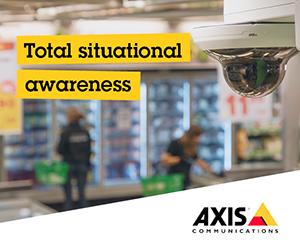DESIGNING OUT CRIME
Healing broken Britain
By John Wilson, Executive Editor
In these days of heated debate around global warming and climate change, a desire for a more rapid melting of ice caps, albeit symbolic ones, may not appear to be a helpful contribution. However, when those frozen ice caps represent the polar extremes of a rancorous debate that has split the nation in two, the context and complexion of that desire changes.
As a nation, the UK would welcome a warmer gulf stream of compromise and consideration into everyday discourse. At the time of reading this article, the country will be licking its wounds on the other side of probably one of the most bruising general elections in a generation. What most now accept to be a divisive referendum over Europe, "Brexit" was further conflated into "Brex-hate" to represent fractious divisions over an issue that tore through the countries that make up the European Union, the constituent counties up and down the land, and whole communities, including families, who sat on either side of a debate that was defined by its ill-tempered tone. The anger permeated everyday interactions as part of a general malaise that became synonymous with the rise in hate crime and violence, including incidents where store staff not native to the UK were abused for doing their jobs, as was recorded by bodies such as the Union of Shop, Distributive and Allied Workers (Usdaw), the British Retail Consortium (BRC), and the Association of Convenience Stores (ACS), all of whom show double-digit growth in violence and aggression aimed at the high street.
Compounded by a lack of Police resources to tackle business crime, the autumn of 2019 has seen unprecedented incidents of violence and anti-social behaviour as organised retail crime gangs make use of social media to plan "steaming" raids across the UK and the Republic of Ireland in the same way that it was weaponised during inner-city riots of 2011. These gangs understand the maths around fewer Police officers in town and city centres and, as the name suggests, are prepared to flatten everything and everyone who stands in their way to the point that retailers, who have invested tens of millions of pounds in loss prevention technology and guarding, have lost faith in the law enforcement community and, in some cases, are not reporting incidents because they know it will, in the current climate, make little or no difference.
The Co-op
One community retailer, which has endured more than its fair share of violence, aggression, and intimidation, is taking a stand against the behaviours that have cast a dark and long-lasting shadow over its store staff and the communities they serve. The Co-op, which has thousands of convenience stores across the UK and has brand values aligned to its ethical approach to retailing, has launched a major campaign to dramatically reduce the 1,279 incidents of violence, aggression, and hate crime that occurred at its premises in the last twelve months.
The "Safer Colleagues, Safer Communities" campaign is focused on tackling crime and violence and protecting colleagues. Jo Whitfield, retail chief executive for the Co-op said at the launch, "Nothing is more important than protecting our colleagues now and in the future."
The organisation's Safer Colleagues, Safer Communities report sets out why tackling crime against colleagues and the communities in which they live is so important and what it will be doing in the coming months and years ahead to tackle it. As part of the launch, the Co-op made a hard-hitting short film using real store workers talking about the personal legacy of violence and intimidation levelled against them and highlighting the launch of LifeWorks, the counselling service available to all victims to help them to come to terms with, and make sense of, what happened to them.
The Co-op operates in almost every community in the UK, and its 4.6 million members also live in those communities. In December 2018, the Co-op's National Members Council voted for Safer Colleagues, Safer Communities to become an official Co-op campaign. The members made it clear that by campaigning through Safer Colleagues, Safer Communities to keep colleagues safe in store, the Co-op should also be campaigning to tackle the causes of crime in communities, which is driving what the organisation wants to see in those stores.
The campaign has been split into three elements: operational, action, and investment. Over the last three years the Co-op has invested £70 million in security, crime prevention, and colleague safety measures and, at its annual general meeting in May 2019, committed to maintain this level of funding for the next three years.
A key area for the Co-op has been in-store connectivity, which enables colleagues to talk to each other in different parts of their stores and to others who can help in circumstances where there is an incident. To this end, the Co-op has spent £4.5 million on new headsets that are now in all stores, as well as tablet devices that allow colleagues to spend more time on the shop floor, rather than in the back office. This allows staff to provide a better service and customer experience on the shop floor while also helping colleagues feel more connected and reassured that they are not alone.
Whereas traditional CCTV has been a loss prevention staple for many years, the Co-op has recognised that CCTV does not provide proactive support to colleagues. So the business has developed a partnership with a third-party supplier that specialises in technological innovation in security, including intelligent CCTV (iCCTV), which is one of the most sophisticated and leading-edge approaches to protecting colleagues. It allows the business to proactively target persistent shoplifters and work with the Police to reduce their impact on colleagues safety and well-being. So far, the Co-op has installed iCCTV in around 600 of its stores and is in the process of rolling it out to a further 400 units.
On the physical side of deterrence, the Co-op is currently testing additional forensic support across its food stores. SmartWater fog systems are mainly located close to the entrances of the stores and are particularly effective in the kiosk areas, which are typically targets of crime because of high-value merchandise such as tobacco. As the name suggests, once activated, a dense fog obscures the intruder's vision making it increasingly difficult for them to reorient themselves and leave the store. It also covers the criminal in a spray containing a unique forensic signature, a form of detection that is guaranteed to last at least five years and is invisible to the naked eye. This signature spray, which the store thief may believe they have washed off, leaves a unique audit trail that helps Police to track criminals and stolen goods, which can then lead to increased conviction rates.
The business encourages and supports colleagues to contact LifeWorks, the Co-op's counselling team who assist and aid colleagues impacted by incidents of violence and aggression and ensure they receive the right level of emotional support. This post-incident service is in addition to a dedicated response and resilience team based within the Co-op's support centre, who are on hand to provide immediate backup to affected colleagues.
Influencing Government
These are tactical solutions to help reduce incidents as well as support staff trying to cope with day-to-day violence and aggression. But what about the ongoing hearts-and-minds campaigning and lobbying to mobilise political and law enforcement support and steer it towards the sharp end of a problem impacting staff across the business to such an extent that it has become an almost normalised "part of the job" and, as a result, often unreported? Here, the Co-op is at the front line of campaigning action. It supported Usdaw's Respect for Shopworkers Week during November 2018, which formed part of the union's "Freedom from Fear" campaign that it has run since the early noughties. As part of the Co-op's support, the business also hosted forty-eight Members of Parliament in its stores during the campaign week. The visits helped MPs to understand the realities the Co-op's colleagues face and highlight the business's determination to protect those colleagues. The campaign worked so well that the business supported the week again this year.
In October 2018, the Co-op also supported the Right Honourable MP David Hanson's amendments to the Offensive Weapons Bill, which would make attacks on shopworkers who are selling age-restricted goods an offence that would carry heavier sentences. The Co-op hosted guest blogs from the MP himself and from MP Alex Norris providing opportunities for colleagues and members to add their voices by petitioning their local MPs to support the amendments.
In April 2019, before the Offensive Weapons Bill received Royal Assent, an opportunity arose for some additional targeted engagement with MPs, so the Co-op wrote to over sixty MPs sending them tailored, constituency-specific briefings ahead of a Westminster Hall debate that was led by MP David Hanson. The debate had a specific focus on shoplifting as well as aggressive and violent behaviours, and the Co-op was mentioned by a number of MPs who had received the briefings.
As part of its campaigning, the Co-op will continue to use the leading and ethical position it has built up to continue to influence Parliament and Government to provide greater protection for shopworkers. To this end, in April 2019, the Home Office published a call for evidence asking for the views of organisations and individuals to aid their understanding of the problem of violence and abuse toward shop staff in England and Wales. The Co-op encouraged colleagues to respond to this call for evidence and share their stories as they did in the video alluded to earlier in this article. As a result, over 600 Co-op colleagues shared their personal testimonies with the Home Office.
Alongside the powerful and shocking testimonies submitted by colleagues, the Co-op submitted a brief that included ten recommendations to Government and Police and Crime Commissioners (PCCs). The recommendations included a greater focus on violent retail crime and creating a specific offence that carries an aggravated and punitive sentence for attacks on staff trying to enforce age-related sales.
Jo Whitfield, the Co-op's retail chief executive has been clear since the start of this campaign that "nothing is more important than protecting our colleagues now and in the future." She showed this again when she appeared on the BBC Breakfast sofa talking about the reality of what colleagues face day-in day-out, detailing how the Co-op is taking action and investing in the safety of its staff. She called on the Government to prioritise retail crime and to better protect shopworkers through tougher sanctions for offenders and community investment to tackle the causes of crime. "We regularly engage with the Government on this campaign and have offered where we feel that we have the assets to address the crime that we see in all of our communities," she said.
Violence Is not Part of the Job
Early on in this campaign, the Co-op commissioned Dr. Emmeline Taylor, reader in criminology at City University, London, to produce research on both the impact of violence on shopworkers and the motivations of offenders. This research was launched at the House of Commons on 10 September 2019. The It's not Part of the Job report executive summary said, "Violence and aggression in shops can have far-reaching and devastating consequences for shopworkers, their customers, and the communities that they serve. Multiple indicators irrefutably demonstrate that the frequency and severity of violent incidents in the retail sector have been increasing significantly across England and Wales. Assaults and threats committed against the wholesale and retail sector have increased almost three-fold from 524 incidents per 1,000 premises in 2016 to 1,433 in 2017 according to the Home Office's Commercial Victimisation Survey (CVS).
The British Retail Consortium estimates that industry spend on crime control is at a record level, surpassing £1 billion per annum for the first time in the 2017-18 financial year. In addition to industry-led initiatives, the sector needs Government action to stem the tide of abuse against shopworkers and address the underlying causes that are known to result in violence. The true scale of retail crime remains unknown due to severe under-reporting to the Police. As a result, it is often overlooked in Police strategic plans.
Shop theft is considered to be a gateway crime, which, if unmonitored and unpunished, can escalate in frequency and seriousness before leading on to other criminal activity, including violence.
Shopworkers report being under increasing pressure to enforce sales restrictions under the Licensing Act 2003, and this is creating situations in which they are facing heightened levels of violence and abuse. The Offensive Weapons Act 2019 introduces more age-restricted sales without any protection for shopworkers tasked with enforcing them."
Through its Local Community Fund, the Co-op has given £4.3 million to more than 1,600 causes across the UK that are tackling the causes of crime. In a letter to the then Home Secretary Savid Javid in March 2019, Jo Whitfield wrote, "As a mother of two teenage boys and living two miles from the scene of the murder of Youseff Makki in Altrincham, the horror of these crimes has been brought even closer to me. Moreover, as CEO of Co-op Retail, with 60,000 colleagues in 2,500 stores across communities all over the country, I see every day the violence that my colleagues face. The threat of weaponised attacks on our customers has grown; research has shown that at least six shopworkers are threatened with a knife, and two with a gun, every day of the year."
At the 2019 Co-op annual general meeting, members voted in favour of a motion that called not only for maintaining levels of funding for crime prevention, security, and colleague safety but also for building on increased support to community groups who tackle the root causes of violent crime to help individuals in those communities to reach their full potential. This is based upon the Co-op's belief that businesses have assets that can be used to address the issues communities and societies face. Those assets may be financial, professional expertise, supply chains, or advocacy.
At the same meeting, Jo Whitfield announced a partnership between the Co-op and the Damilola Taylor Trust, named after the teenage boy brutally attacked and left to die from a leg wound in 2000. The Co-op will be sponsoring a programme run by the trust that helps young people in inner London acquire skills to help them find employment and their true potential, as well as keep them away from gangs. Jo said, "We believe our new partnership will provide a model for how business can support experts on the ground. The funding we will provide will enable delivery of the programme and is being complemented by additional pro bono support from our professional services and from colleagues who are volunteering on the programme."
Community partnerships can be very successful as the Co-op has seen in the partnership work it has in south Manchester with Greater Manchester Police and Chorlton High School, providing the business with the opportunity to work with young people who were shoplifting, to educate them through restorative justice rather than criminalising individuals at a young age. The relationship with the Police has allowed the Co-op to utilise the resources of the local policing team to provide patrols in the vicinity of stores.
In March 2019 the Co-op also took the decision to stop selling kitchen knives in its stores. At the 2019 annual general meeting, the business announced a partnership with Steel Warriors, which focuses on taking knives off the streets to create gyms that communities can use to develop their skills, improve their mental and physical health, and help tackle the root causes of crime.
The Co-op's multi-faceted colleague-centric approach represents a strategic approach to violence and aggression that significantly chips away at the environment and culture that creates the clash and confrontational situations in the first place. It is doing its "bit" and working with a myriad of other agencies, from schools and community groups to law enforcement and the criminal justice system to affect positive change that retrains and retains personnel who can carry out their day-to-day jobs safely while feeling valued and cared for through a combination of preventative technology and impact counselling. It is a campaign that boldly states that assault and intimidation are "not part of the job" and raises the bar for other retail stakeholders that it is part of everyone's job to protect people by removing the oxygen of anger and criminality.





